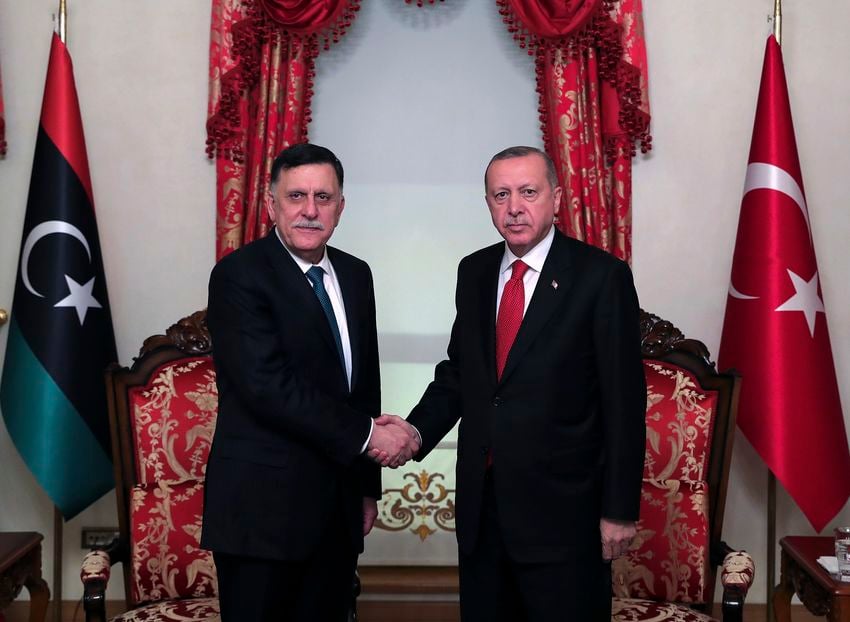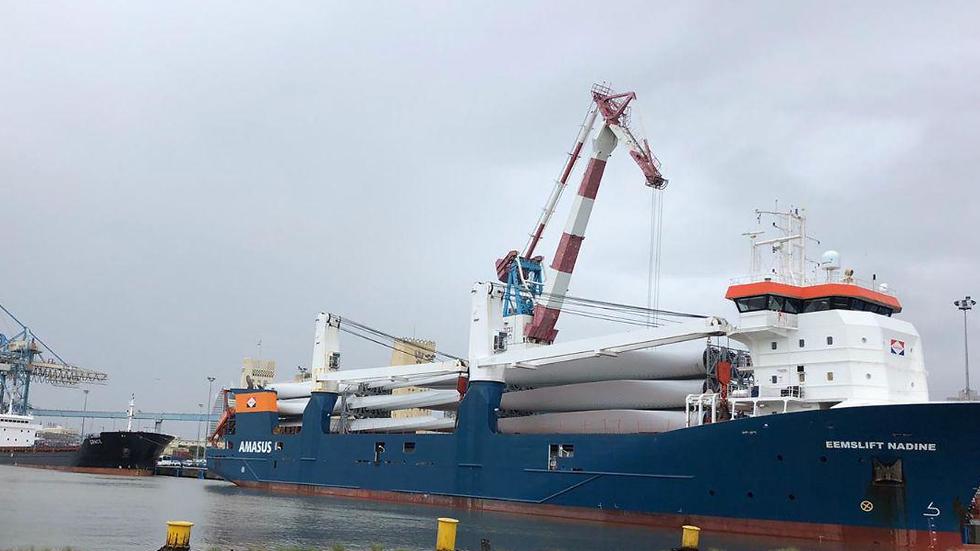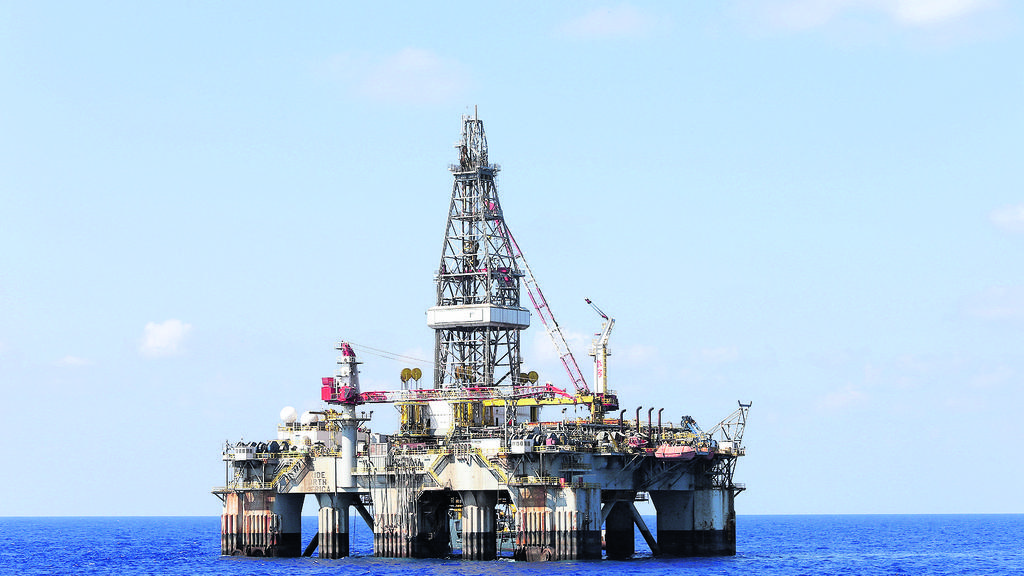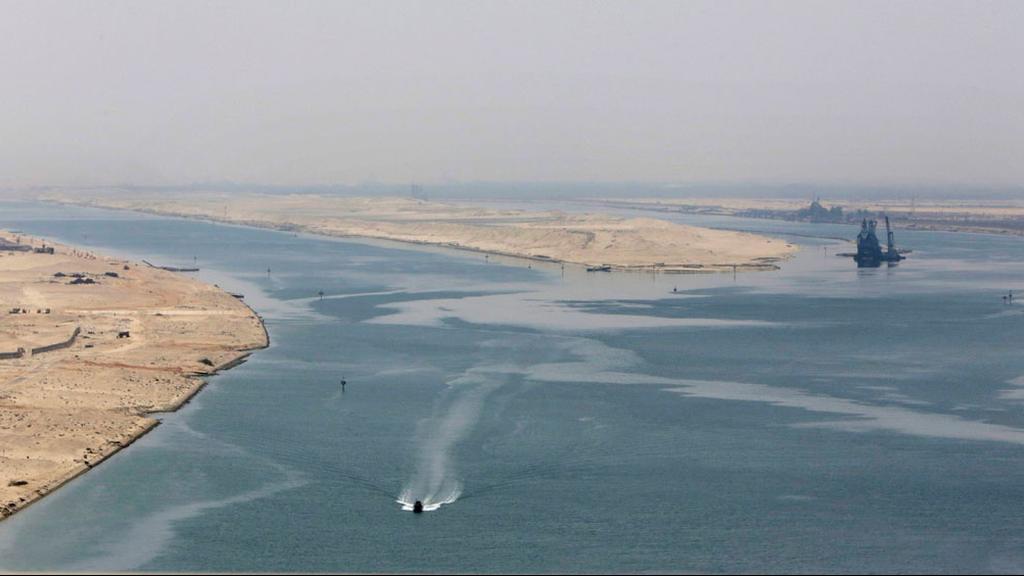Getting your Trinity Audio player ready...
Turkey and Libya recently signed an agreement on maritime boundaries in the Mediterranean including the designation of an Exclusive Economic Zone (EEZ).
Turkey could be in a position to detain, inspect, and investigate any vessel crossing the designated area.
4 View gallery


Turkish President Recep Tayyip Erdogan, right, and Libyan leader Fayez al Sarraj
(Photo: AP)
For Israel, which is 99% reliant on the sea for import and export of goods, this is an unacceptable position.
According to press reports earlier this month, the Turkish navy barred an Israeli research expedition from completing its work in the EEZ of Cyprus which was coordinated and licensed by the government.
The Turkish naval vessel demanded the Israeli ship leave the area claiming it is in exclusive Turkish territorial waters.
Is this a sign of things to come? Time will tell.
Two of Israel's wars (1956 Sinai campaign and 1967 Six-Day War) broke out over navigation rights. Israel must take note of a new reality taking hold in the Mediterranean.
It must regard Turkey's actions as a substantial strategic threat and consider what it may do to respond to it.
The agreement signed by Turkish President Recep Tayyip Erdogan and Fayez al-Sarraj, chairman of the Presidential Council of Libya, has many geopolitical implications.
This EEZ designation essentially carved up much of the energy-rich Eastern Mediterranean between Turkey and Libya, prompting a wave of international condemnations first and foremost from Greece, Egypt, and Cyprus, who may be directly or indirectly affected.
After years of deliberations, the 1982 United Nations convention was signed regulating maritime boundaries and defining "Exclusive Economic Zones."
These EEZs came as a result of advancements in deep-sea exploration technologies, the discovery of natural resources on the seabed and new extraction technologies for these natural resources.
Coastline countries demanded economic zones outside their territorial waters up that ended only 12 nautical miles from shore, and the UN agreement stipulated that exclusive rights to resources can be designated to a given country at a distance of up to 200 nautical miles from shore including exclusive rights to mine and exploit any natural resource in the sea and on the seabed.
Marine vessel freedom of navigation in those areas remained for the most part unaffected according to maritime agreements, but the coastline country retained the right to protect its economic zone, prevent ecological or any other damage to it and deny research expeditions in it.
Exclusive Economic Zones are at the center of debate on the extent of exclusive rights some of the coastline countries have assumed.
The disagreement is a result of a compromise reached between countries wishing to expropriate more territory at sea which may yield more natural resources, and others, who operate large fleets and wish to limit the EEZs as much as possible in order to ensure as much freedom of navigation as possible.
The compromise language in the 1982 agreement states there will be "sufficient consideration" and that countries are urged to show understanding and avoid provocation.
But today, a different policy is emerging from coastline countries that are attempting to increase their authority over the EZZs and increasingly regard them as part of their territorial waters.
The UN Maritime Boundaries agreement grants naval vessels immunity from inspection, but does not clarify that immunity inside EEZs.
The United States, which is not a signatory of the agreement, considers the EEZ as an economic designation only. While China which did sign the UN agreement believes the coastline country possesses the right to regulate any activity within their EEZ, including military activity. This lies at the crux of the conflict between the American and Chinese navies in the South China Sea.
Costal countries may declare EEZs but are not required to do so.
In order to designate an area an EEZ, the country must legislate a specific law specifying the exact boundaries of the EEZ and the policy governing maritime movement in it.
Once a law is passed, it must be filed with the UN but does not require any UN mandate or authority.
When two countries agree to share their EEZ, as in the recent case of Turkey and Libya, they are required to file their agreement with the UN but do not need any authorization beyond that.
Since the Mediterranean is a relatively small area, the eventuality of all its coastal countries declaring EEZ's there would be no unclaimed sea left.
When EEZs overlap a compromise mechanism exists that always results in countries having to part with some territory.
Countries along the coastline of the Mediterranean have always opted not to declare EEZs so that they would not be compelled to give up territory on the one hand and to avoid conflict with neighboring countries on the other.
Greece, for example, did not declare any area an EEZ because if it had done so, Turkey would have been left without any economic zone in the Mediterranean.
The new EEZ declared recently by Turkey and Libya ignores such consideration. It was born of defiance and in contradiction to acceptable norms of "sufficient consideration" as specified by the 1982 UN Maritime Boundaries Agreement.
By Turkey's disregard for the economic waters of Greece, Cyprus, and Egypt, Ankara is in effect annexing those areas pending an appeal to international tribunals, which can take many years to resolve.
In practical terms, Turkey created a sea border the width of the entire Mediterranean.
Should it decide to enforce the extended version of EEZ rights, the immediate victims will be any ship intending to sail from east to west in the Mediterranean, including traffic to and from the Suez Canal.




